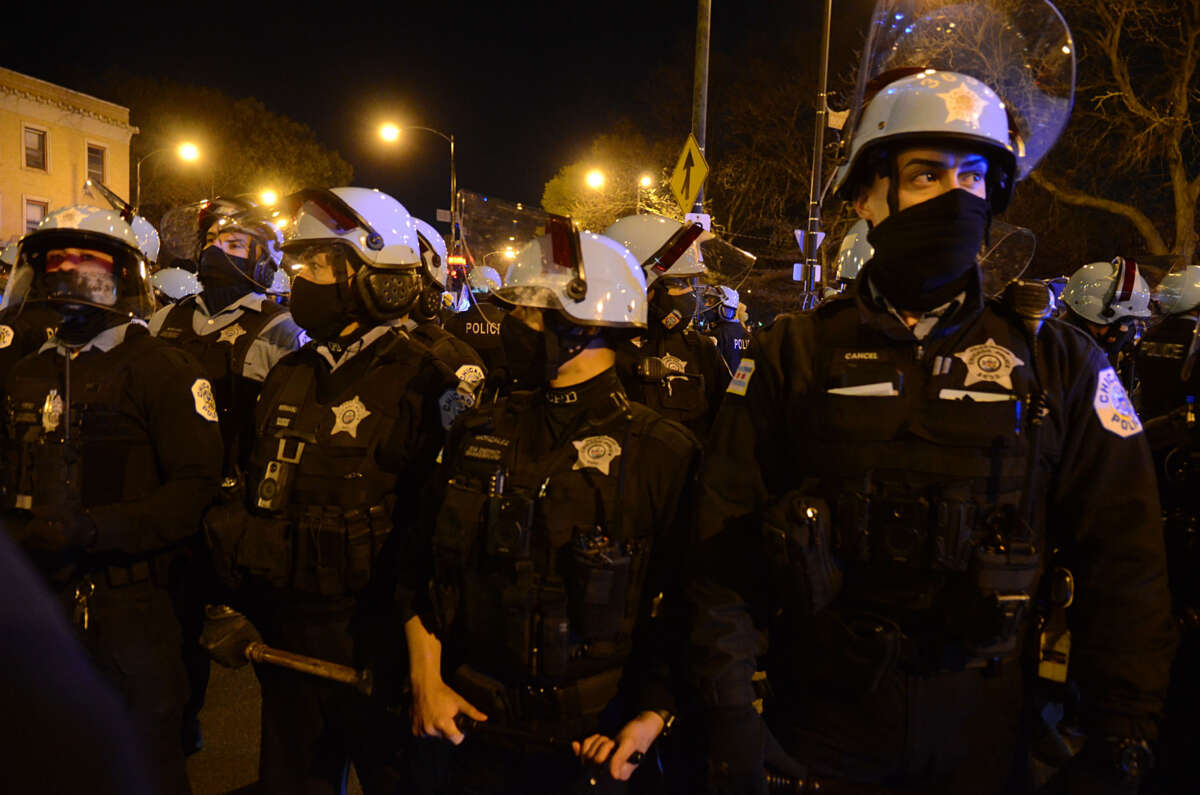Honest, paywall-free news is rare. Please support our boldly independent journalism with a donation of any size.
A new policy banning Chicago police from “active participation” in hate and extremist groups was unanimously approved by a civilian-led police oversight panel on Monday.
The policy was approved after the Chicago Police Department (CPD) investigated officers who were found to have connections to far right, white supremacist groups — including the Proud Boys, Oath Keepers and Three Percenters — but took little action.
“Groups that focus on biased conduct don’t always commit crimes, but its conduct is still not conduct that we think is appropriate for Chicago police officers,” Yvette Loizon, a member of the city’s Community Commission for Public Safety and Accountability, told CBS News.
While the CPD general orders already prohibit officers from “membership in or affiliation with criminal organizations and from association with known members of criminal organizations,” Chicago police officials have said that joining extremist groups like the Oath Keepers does not constitute a rule violation. The policy change would broaden this rule to prohibit officer association with “biased” organizations, like hate and extremist groups.
The Oath Keepers is one of the largest far right anti-government groups in the U.S. today, and actively recruits members of the police. Members of the extremist group have faced a series of arrests since the group was founded in 2009, and played a key role in the January 6, 2021, Capitol riot. In the aftermath of the Capitol riot, Chicago police union president John Catanzara publicly defended the insurrectionists.
In 2021, investigations by NPR found that 13 CPD police officers were active members of the Oath Keepers. One of the Oath Keepers uncovered by the NPR investigation was police officer Phillip Singto, who mentioned “Oathkeepers” under the accomplishments section on his LinkedIn profile. While the CPD conducted an internal investigation into the level of Singto’s activity in the group, Chicago’s Inspector General Deborah Witzburg told the Chicago Sun Times that the CPD declined to review personal records and other documents as part of its investigation. According to the Invisible Institute, a journalism nonprofit based on the south side of Chicago, Singto is still active in the CPD, and currently has six complaints against him, including a use of force complaint.
The Southern Poverty Law Center (SPLC), a civil rights organization that tracks extremist groups across the country, sent a scathing letter to Chicago officials earlier this year demanding that another Chicago police officer, Robert Bakker, be fired for his connections with designated hate group the Proud Boys.
“The CPD is neglecting its commitments to protect and support Chicago communities by allowing Bakker to continue in his role as a law enforcement officer,” Jeff Tischauser, senior research analyst at the SPLC, said in the letter. “Allowing Bakker to retain his role can create an environment of impunity for other officers who may associate with violent groups and contribute to the erosion of trust between the public and law enforcement authorities.”
While Bakker was suspended after police investigations found that he had failed to disclose that FBI agents had questioned him about his ties to the group, he was later reinstated. After police investigators learned that he had made contradicting statements about his activities with the hate group and lied to investigators about attending a barbecue linked to the group, he was suspended again for 120 days.
“[T]he handling of this incident demonstrates that the Chicago Police Department lacks clear policies and procedures for how to address involvement of its officers in groups advocating extremist views and conduct,” Tischauser said. “We urge you to adopt a strong policy against the involvement of Chicago Police officers in white supremacist and extremist activities.”
While Bakker currently remains on the force, this policy change will likely end his career with the CPD.
“I don’t know any other jobs really where they spend so much time defending somebody who they should normally cut,” Chicago City Council member Andre Vasquez told the Chicago Sun Times. “It’s wild to me, and we all suffer for it.”
Media that fights fascism
Truthout is funded almost entirely by readers — that’s why we can speak truth to power and cut against the mainstream narrative. But independent journalists at Truthout face mounting political repression under Trump.
We rely on your support to survive McCarthyist censorship. Please make a tax-deductible one-time or monthly donation.
